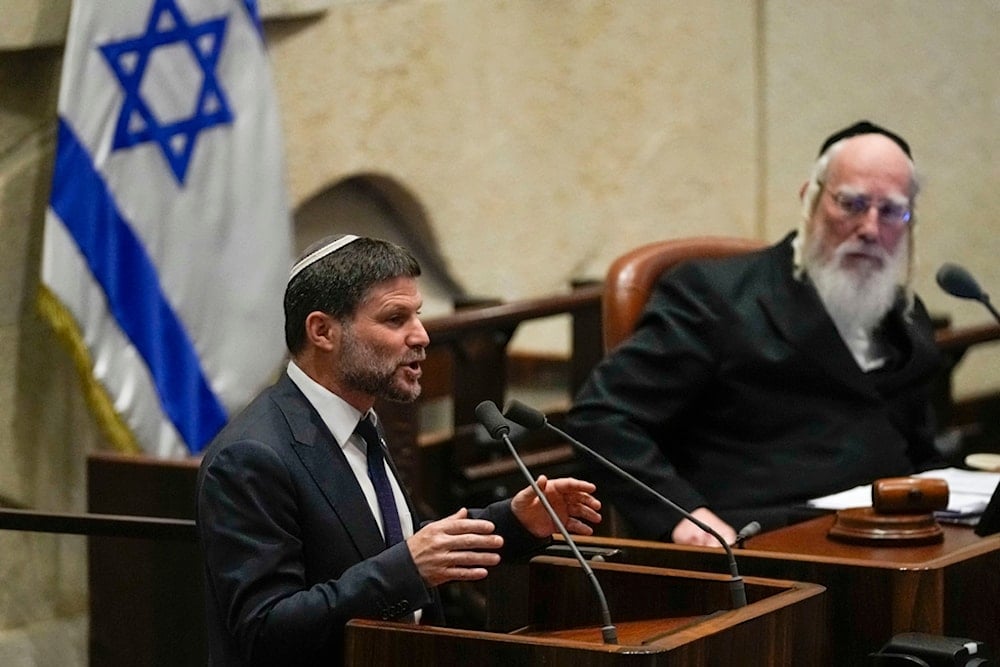Smotrich says lost faith in Netanyahu over ‘half-measure’ Gaza plan
The Israeli Finance Minister accuses Netanyahu of abandoning a "full victory" in Gaza, rejecting the cabinet's plan to occupy Gaza City as a dangerous half-measure.
-

Far-right Israeli Finance Minister Bezalel Smotrich speaks at the Knesset, in occupied al-Quds, occupied Palestine, Monday, July 10, 2023 (AP)
Far-right Israeli Finance Minister Bezalel Smotrich sharply criticized Prime Minister Benjamin Netanyahu on Saturday, saying he no longer believes the premier is willing to pursue a “decisive victory” in Gaza. The comments followed the security cabinet’s approval of a plan to occupy Gaza City, which Smotrich criticized as a “half-measure” that falls short of destroying the Resistance movement Hamas.
In a video message, Smotrich accused Netanyahu of reversing course after weeks of working together on a strategy aimed at dismantling Hamas’ military and civil infrastructure while securing the release of all captives. He alleged the approved plan prioritizes a partial hostage deal, giving Hamas the opportunity to “recover and rearm.”
“This is not how you win a war,” Smotrich said, warning that such an approach risks soldiers’ lives and international backlash without achieving victory. He urged Netanyahu to reject any partial agreements and instead demand either Hamas’ unconditional surrender and full captives release or its complete military defeat. His vision includes occupying large parts of the Gaza Strip and promoting “voluntary migration” from the blockaded territory.
Intra-alliance escalations
While Smotrich stopped short of threatening to quit the coalition, his remarks reflect growing friction within Netanyahu’s government. Alongside far-right Police Minister Itamar Ben-Gvir, Smotrich voted against the Gaza City plan. Both ministers advocate for permanent Israeli occupation of the Strip and the re-establishment of settlements.
Netanyahu has defended the cabinet-approved operation, saying it will help secure the Strip, remove Hamas from power, and eventually transfer governance to an “unspecified Arab force.” He has ruled out both permanent Israeli control and a role for the Palestinian Authority, telling Fox News, “We don’t want to govern it… we want to hand it over to Arab forces that will govern it properly.”
IOF Chief of Staff Eyal Zamir reportedly opposes the Gaza City operation, warning that it endangers both soldiers and the roughly 50 captives still held in the blockaded territory, 20 of whom are believed to be alive. Captives' families have staged mass protests in Tel Aviv against the government’s decision, clashing with police during demonstrations on Thursday and Saturday nights.
Tensions erupt between Smotrich, IOF chief
A sharp confrontation reportedly broke out between Israeli Finance Minister Bezalel Smotrich and Chief of Staff Lieutenant General Eyal Zamir during a meeting of the mini-security cabinet held Monday evening, Yedioth Ahronoth reported Tuesday.
The clash occurred as senior military officials discussed the future of the war on Gaza, with Zamir warning that a full occupation of the Gaza Strip would take years and suggesting that the army should focus, at this stage, on limited ground incursions instead.
According to Yedioth Ahronoth, Smotrich exploded in anger at Zamir’s remarks, accusing him of hypocrisy and lack of consistency: “We already miss [former Chief of Staff] Herzi Halevi. You owe him an apology… You attacked him for saying exactly the same thing!” Smotrich reportedly shouted.
Smotrich's frustration with Gaza war strategy deepens
The reported altercation is the latest sign of growing friction between Smotrich and "Israel’s" top military leadership, particularly regarding the direction and pace of military operations in Gaza.
The newspaper noted that Smotrich had previously clashed repeatedly with Herzi Halevi and now appears to be adopting a similar confrontational stance toward Zamir, fueled by his dissatisfaction with the army’s Gaza strategy.
Smotrich, a key figure in the far-right coalition government, has pushed for a more aggressive and expansive campaign in Gaza, including the full reoccupation of the Strip and permanent control of the territory, a position opposed by sections of the Israeli military leadership, who view such moves as strategically and logistically unsustainable.
During the meeting, Zamir’s assessment highlighted the operational risks and duration associated with a full-scale occupation. He advocated for continued, targeted ground operations to reduce Resistance infrastructure, warning that attempting to seize and hold all of Gaza would require years of deployment and massive resources.

 4 Min Read
4 Min Read










